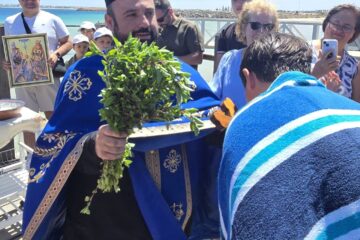Archimandrite Vassilios Papavassiliou
Holy Week is the heart of the Christian Orthodox Faith and the centre of the yearly cycle of Christian Feasts. Every year our churches are packed at Holy Week and, come the last three days, they are bursting at the seams with both people who attend church every Sunday and people who attend only on special occasions. Holy Week brings the pious and the not so pious together in a way that the most ambitious missionaries can only dream of. I am not going to try to answer the reasons for this. I am going to try to explain not so much what makes Holy Week unique and different from every other time of the religious year, but rather why Holy Week is, as I said, the heart of the Christian Faith.
Time will not permit us to look at each day and service of Holy Week in turn, so we will look at some selected events, readings and hymns. But before we do this, permit me to make what I consider to be an essential introduction. It is essential because many of us wrongly assume that everyone has grown up knowing the basic principles of Christianity – this is no longer so, even in many Christian countries – and without first understanding who Christ is, we cannot hope to understand Holy Week. I am not, of course, going make a brief exposition of the Orthodox Faith just so that I can explain Holy Week (to anyone who needs me to start from scratch, this talk will probably seem like a waste of time), but there is a pseudo-Christian trend nowadays, which is very common, and which I feel I must address before I go any further: and this is the popular opinion that Christ is a great moral teacher, a revolutionary, a great prophet perhaps, but nothing more. According to this view of Christ, ‘Son of God’, means nothing more than God adopted him because God liked him so much. I am trying here to prevent anyone thinking about Christ in the way that so many people seem to think of him. I have often heard people, even people who claim to be Christians, saying: “I accept Jesus as a great moral teacher, but I don’t believe that He is literally God”. If this is how you see Christ, then Holy Week won’t mean a thing to you. So, permit me, before I get started on Holy Week, to put things into perspective.
A man who was just a man, and who said the things that Jesus said, would not be a great moral teacher at all. He would be a complete and utter lunatic. He claimed that He is eternal. He claimed that He will judge the world at the end of time. He claimed to have the authority to forgive sins. This last claim tends to slip our attention because we have heard it so many times that we no longer realize what it really amounts to. If Christ were just a man, a mere moral teacher, this claim to forgive sins would be absolutely absurd. We can all understand how somebody forgives offences against his own person. You insult me, or kick me, or steal my wallet, and I forgive you. But what about someone who forgives somebody for sinning against somebody else? Let us imagine that John steals from Elizabeth, then I come along and I say “John, you’re forgiven”. I have not even asked Elizabeth if she has forgiven him. Who on earth am I to come along and forgive John for what he did to Elizabeth? This would be laughable. But let us suppose that I am the person who invented the rule “you shall not steal”. If I made the rule, then I have the right to forgive someone for breaking it. This is what Jesus’ claim to forgive sins amounted to. This is why the Jews were so shocked and offended by that claim. This is why they called it ‘blasphemy’ and why many of the Pharisees wanted Jesus dead. If he has the authority to forgive people for breaking the commandments, then He must be the God who gave the commandments. He must be the God who appeared to Moses in the Burning Bush on Mount Sinai, who gave the Ten Commandments to Israel. That is indeed who Christ is. And my point is that we either worship Him as God, or we dismiss Him as an utter madman, or something worse, but let us not come up with any patronising rubbish about Him being a great moral teacher. He did not give us that option.
In the Orthodox Church, Christ as God is the focal point of the Passion and Resurrection. In many of the hymns of the Church, and Holy Week is no exception, the hymn writers are constantly expressing their wonder at the God who created the universe becoming a man and, what’s more, such a man and undergoing such things as we would think beneath us. If being born in a grotty cave surrounded by lots of filthy animals is undignified for us, how much more undignified is it for God! If being whipped, spat on, beaten up, insulted, stripped naked and hung up and nailed on a cross for all to see and for everyone to tell you “serves you right you stupid idiot” is unfair on us, how much more unfair is it on God the Creator! We will see, particularly when we come to the hymns of Great Friday, how the Orthodox Church focuses on this strange wonder: God doing things for us that are infinitely beneath Him.
Source: pemptousia.com




0 Comments